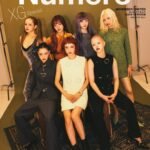Photo Credits: Vogue Korea The Black label
For anyone who’s ever been captivated by the irresistible rhythms of K-pop or the poetry of classic rock, the story of Rosé—born Roseanne Park—provides both a blueprint and an inspiration. Her rise from humble beginnings in New Zealand and Australia to the world’s biggest stages and most exclusive fashion houses speaks to the power of artistic conviction, obsession with craft, and the courage to evolve authentically, even under the world’s glare.
A Multicultural Prelude: Roots in New Zealand and Australia
Rosé was born on February 11, 1997, in Auckland, New Zealand, to South Korean immigrant parents. When she was seven, the Park family relocated to Melbourne, Australia, and it was here that the first notes of her musical journey began. Australia’s suburban calm gave her time and space to teach herself guitar, sing with church choirs, and absorb influences ranging from Beatles vinyl to soaring K-pop anthems she discovered online.
Rosé would later recall the innocence of those days: “Music was just always there. The guitar became my best friend, and singing was how I connected with the world”. Mirroring the stories of many classic rock and soul legends, her musical exploration was fueled by curiosity and necessity—there weren’t as many distractions, and self-expression was an escape.


The Leap of Faith: From Auditions to Seoul
At 15, a life-changing suggestion came from Rosé’s father: audition for YG Entertainment, the Korean label behind K-pop’s biggest acts. She thought he was joking—international stardom seemed impossible from suburban Melbourne. But in 2012, she joined the Sydney audition as one of 700 hopefuls. She placed first.
Signing with YG meant uprooting to Seoul, leaving friends, school, and comfort behind for the intense world of Korean entertainment trainee life. The training years were grueling—four years of relentless drills, vocal training, dance practice, and performance simulation. Rosé describes these years as both transformative and unforgiving: “There’s a constant pressure to be perfect. Some days, I wasn’t sure I could do it. But every time I sang, that’s when I felt most real”.
Blackpink: The Global Launchpad
In 2016, Rosé, now fluent in Korean and forged by the infamous “idol” training regime, was unveiled as the final member of a new girl group: Blackpink. The rest is pop history. Their debut single album Square One, with megahits like “Whistle” and “Boombayah,” broke records and expectations—ushering in a new generation of international fans, from die-hard K-pop devotees to rock-and-roll veterans searching for fresh sounds.
Rosé quickly became known for her distinctive, soulful voice—a rarity in the fast-paced world of idol pop. Her performances on programs like King of Masked Singer stunned audiences and showcased her ability to interpret a broad range of genres. She later explained, “I didn’t know if the audience would like my singing… I just wanted to find the real me in each song”. It’s a sentiment anyone from the age of Sinatra to Beyoncé can relate to—the search for identity through performance.


Solo Stardom: Rosé Steps Forward
While Blackpink’s multinational hits continued, Rosé’s ambitions blossomed. In 2021, amid global anticipation, she released her solo debut single album R, led by the introspective anthem “On the Ground.” The track’s combination of modern pop with confessional lyrics resonated worldwide, quickly becoming the first song by a K-pop solo artist to top the Billboard Global 200 and Global Excl. US charts. “On the Ground” was certified gold and entered charts from South Korea to the US and the UK—bridging genres and generations alike.
But Rosé wasn’t content to bask in existing formulas. As her career soared, so did her creative risk-taking. In interviews, she revealed that solo projects let her “unplug from expectations” and “explore vulnerability” in writing and performance. Her songcraft delved into relatable emotions—doubt, ambition, the quest for authenticity—making her an icon to both young dreamers and music purists.
The Fashion Connection: Saint Laurent and Alexander McQueen
Rosé’s style—a blend of Rive Gauche chic, grunge, and modern edge—attracted the attention of fashion’s elite, notably Anthony Vaccarello of Saint Laurent. She became the house’s global ambassador, regularly appearing on magazine covers and serving looks that combined retro glamour with 21st-century cool. For K-pop fans and veteran music heads alike, these images evoke everything from 1960s Parisian rock stars to David Bowie’s chameleonic aesthetics.
Most recently, Rosé starred on the August 2025 cover of Vogue Korea, wearing Saint Laurent’s fall collection: “I love fashion because it gives me another language to express the real me. When I walk out in Vaccarello’s designs, I feel both powerful and free” (Vogue Korea, 2025).


Triumphs, Struggles, and Artistic Growth
The high points are dazzling—sold-out tours, record-breaking songs like her 2024 collaboration “APT.” with Bruno Mars, which set new standards for K-pop soloists and topped charts globally. Her debut studio album, Rosie, released in December 2024, debuted at number three on the US Billboard 200 and number four in the UK—unprecedented feats for a Korean solo artist.
But the journey wasn’t without hardship. The K-pop system is famously taxing; trainees give up most of their teen years, endure constant judgment, and are expected to embody perfection. Even as a superstar, Rosé faced burnout and pressure. She has spoken candidly about these challenges: “I think I tried to become a perfect girl, perfect performer, perfect everything. But at a point, I wanted to go back to just being me, flaws and all”.
Her story is both warning and encouragement: “If you really love music, if you do it for you, you will find your way—even through all the noise around you”.
Empowering the Next Generation: What Rosé Shows Us
What makes Rosé’s journey resonate across musical generations is her refusal to settle. She succeeded within the K-pop system, then remade its rules, highlighting individuality and self-written music. For young fans dreaming of stardom or older listeners wary of industry hype, her path offers three lessons:
- Follow your core passion, whether that means singing to yourself at midnight or facing down the world’s biggest stages.
- Embrace the grind, but don’t lose your sense of self. The K-pop system is daunting, but authenticity can be your superpower.
- Break rules thoughtfully. Rosé pursued songwriting, fashion, and collaborations that broke the “idol” mold—helping redefine what a pop icon can be.


Legacy and Modern Icon Status
By 2025, Rosé is more than just a star—she’s a phenomenon. Recognized by Time magazine as one of the world’s 100 most influential people and featured in Rolling Stone as a ‘living icon,’ Rosé is living proof that genre, geography, and generation don’t have to define your impact—passion and reinvention do.
Her music and image, whether in a Blackpink banger, a stripped-down solo ballad, or a high fashion spread, continue to inspire legions of new artists and remind lifelong music obsessives why pop stardom, at its best, is about transformation and honest connection.
For those who want to follow, Rosé says it best: “If you’re unsure—take the chance. You never know what song you’re meant to sing next”
Listen to Rosé’s story now on the Vogue website at vogue.co.kr.
fashion editor KIHOH SOHN, JUYEON KO
editor GAYEONG RYU
photographer HEEJUNE KIM
stylist AERI YUN
hair SEONYEONG LEE
makeup JUNGYO WON
nail EUNKYUNG PARK(Unistella)
- From Church Choirs to Global Runways: How Rosé Became a Mega Star and a Modern Icon In August 2025 cover of Vogue Korea
- IDID’s “Dear U” Pictorial for DAZED Korea August 2025: K-pop’s Rising Stars in the Ultimate Fan-Favorite Magazine
- tripleS Announces First Japan EP “SecretHimitsuBimil,” Tokyo Concert and 2025 North America World Tour
- IVE’s Leeseo Unveils Bold New Look in DELING Magazine’s July 2025 Pictorial Preview
- THE BOYZ Unveil Striking Concept for 10th Mini Album ‘a;effect’ in Movement Version Photos
The post From Church Choirs to Global Runways: How Rosé Became a Mega Star and a Modern Icon In August 2025 cover of Vogue Korea appeared first on Kpoppie – Breaking Kpop News and Fashion.















